开学特训卷 2023-2024学年 牛津译林版 八年级英语下册(含解析)
文档属性
| 名称 | 开学特训卷 2023-2024学年 牛津译林版 八年级英语下册(含解析) | 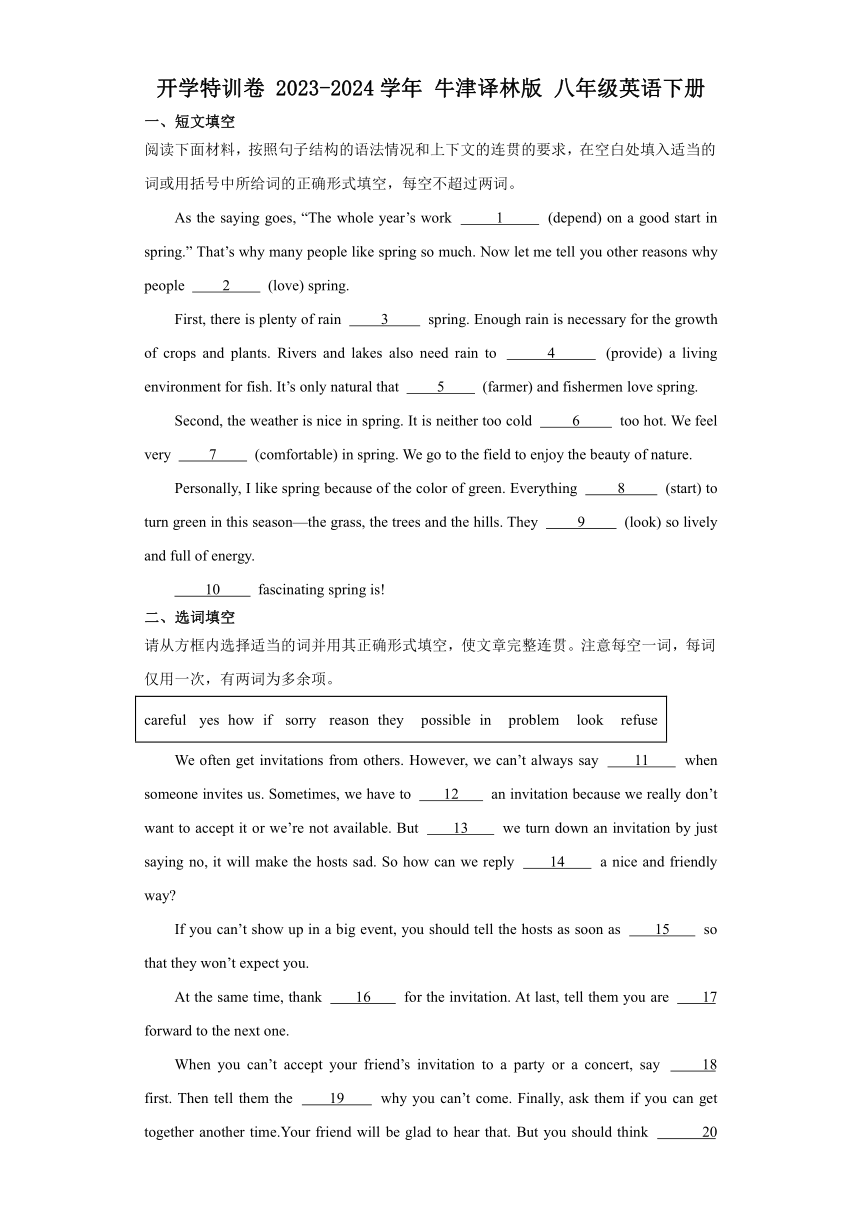 | |
| 格式 | docx | ||
| 文件大小 | 35.1KB | ||
| 资源类型 | 教案 | ||
| 版本资源 | 牛津译林版 | ||
| 科目 | 英语 | ||
| 更新时间 | 2024-02-19 11:36:47 | ||
图片预览

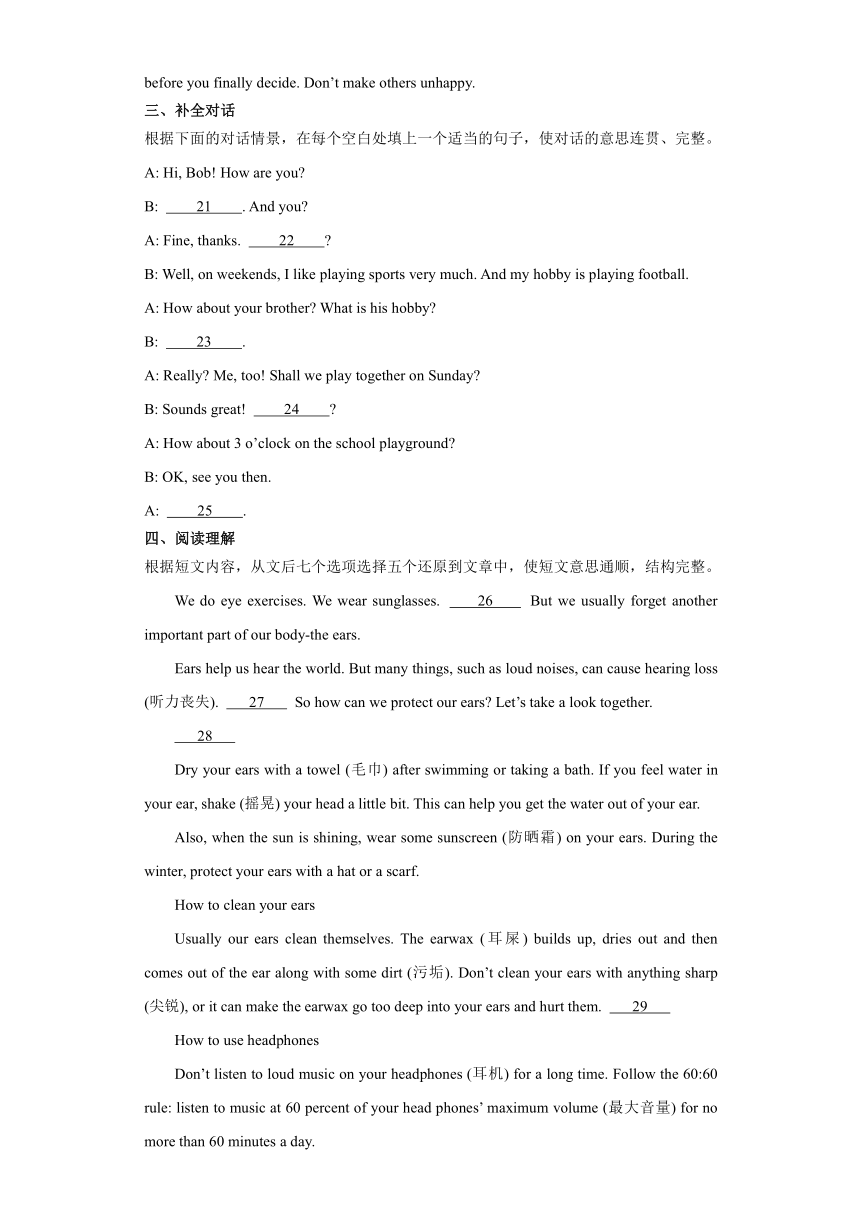
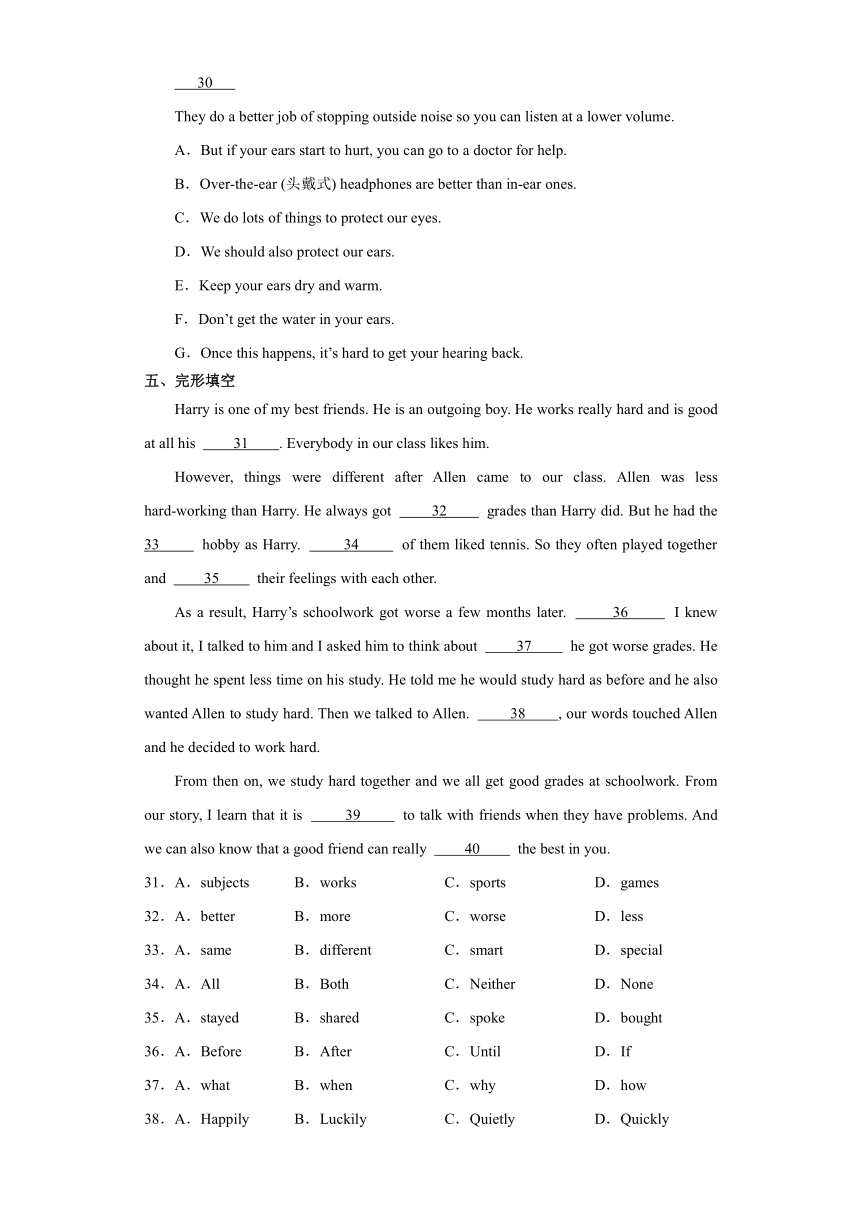
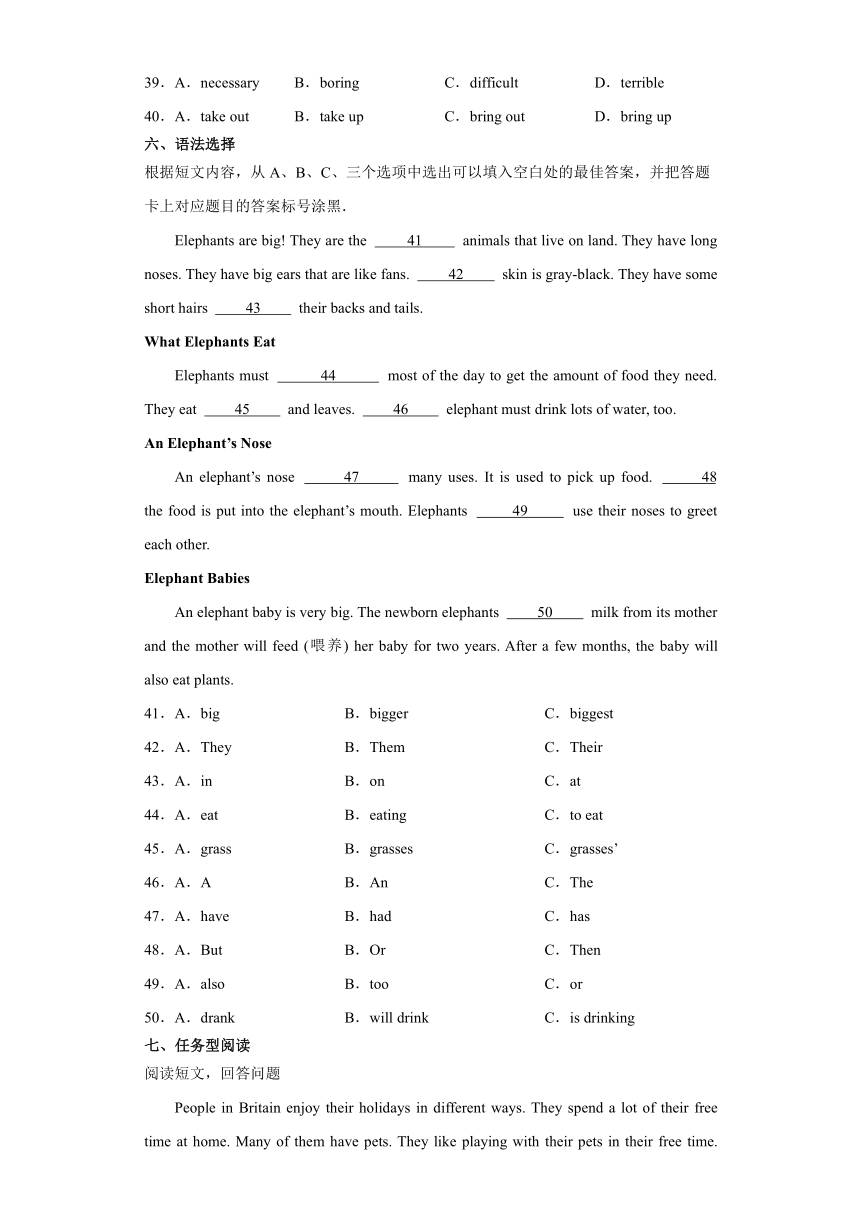
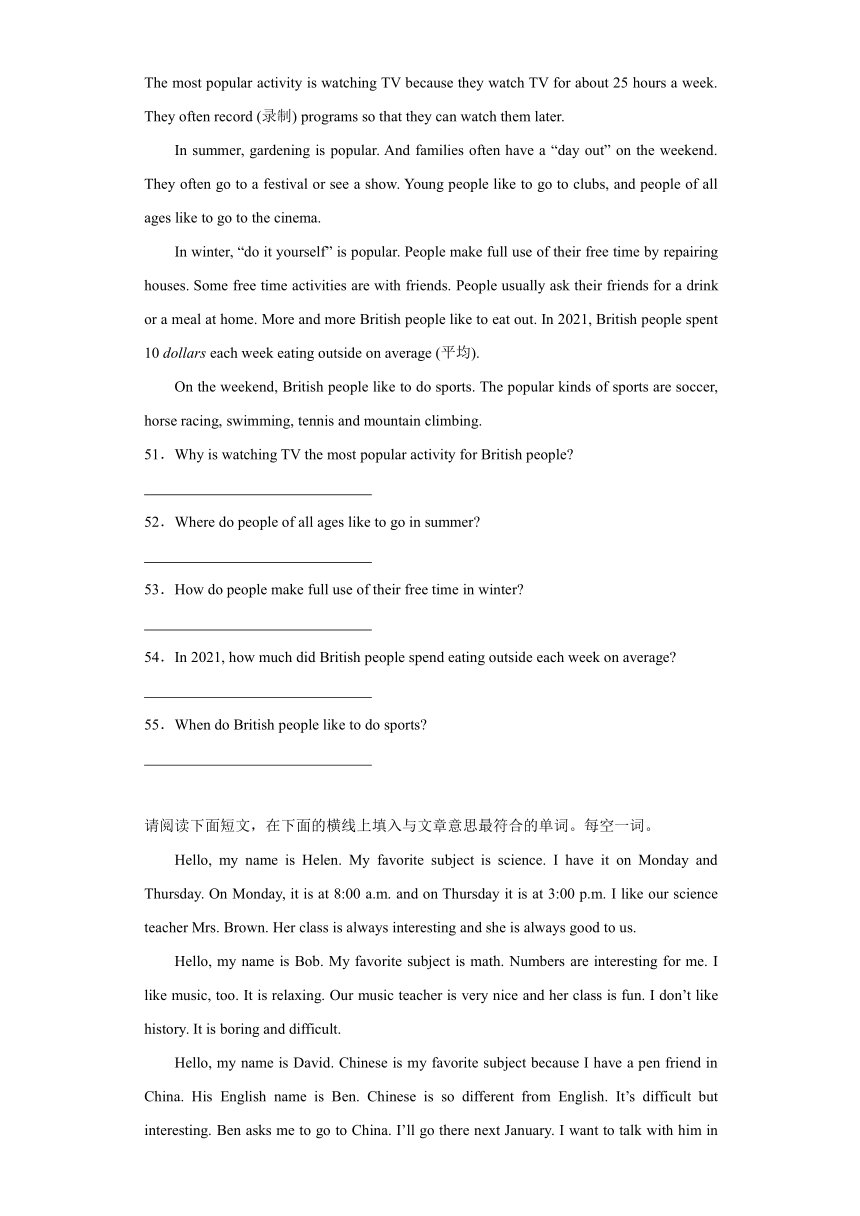
文档简介
开学特训卷 2023-2024学年 牛津译林版 八年级英语下册
一、短文填空
阅读下面材料,按照句子结构的语法情况和上下文的连贯的要求,在空白处填入适当的词或用括号中所给词的正确形式填空,每空不超过两词。
As the saying goes, “The whole year’s work 1 (depend) on a good start in spring.” That’s why many people like spring so much. Now let me tell you other reasons why people 2 (love) spring.
First, there is plenty of rain 3 spring. Enough rain is necessary for the growth of crops and plants. Rivers and lakes also need rain to 4 (provide) a living environment for fish. It’s only natural that 5 (farmer) and fishermen love spring.
Second, the weather is nice in spring. It is neither too cold 6 too hot. We feel very 7 (comfortable) in spring. We go to the field to enjoy the beauty of nature.
Personally, I like spring because of the color of green. Everything 8 (start) to turn green in this season—the grass, the trees and the hills. They 9 (look) so lively and full of energy.
10 fascinating spring is!
二、选词填空
请从方框内选择适当的词并用其正确形式填空,使文章完整连贯。注意每空一词,每词仅用一次,有两词为多余项。
careful yes how if sorry reason they possible in problem look refuse
We often get invitations from others. However, we can’t always say 11 when someone invites us. Sometimes, we have to 12 an invitation because we really don’t want to accept it or we’re not available. But 13 we turn down an invitation by just saying no, it will make the hosts sad. So how can we reply 14 a nice and friendly way
If you can’t show up in a big event, you should tell the hosts as soon as 15 so that they won’t expect you.
At the same time, thank 16 for the invitation. At last, tell them you are 17 forward to the next one.
When you can’t accept your friend’s invitation to a party or a concert, say 18 first. Then tell them the 19 why you can’t come. Finally, ask them if you can get together another time.Your friend will be glad to hear that. But you should think 20 before you finally decide. Don’t make others unhappy.
三、补全对话
根据下面的对话情景,在每个空白处填上一个适当的句子,使对话的意思连贯、完整。
A: Hi, Bob! How are you
B: 21 . And you
A: Fine, thanks. 22
B: Well, on weekends, I like playing sports very much. And my hobby is playing football.
A: How about your brother What is his hobby
B: 23 .
A: Really Me, too! Shall we play together on Sunday
B: Sounds great! 24
A: How about 3 o’clock on the school playground
B: OK, see you then.
A: 25 .
四、阅读理解
根据短文内容,从文后七个选项选择五个还原到文章中,使短文意思通顺,结构完整。
We do eye exercises. We wear sunglasses. 26 But we usually forget another important part of our body-the ears.
Ears help us hear the world. But many things, such as loud noises, can cause hearing loss (听力丧失). 27 So how can we protect our ears Let’s take a look together.
28
Dry your ears with a towel (毛巾) after swimming or taking a bath. If you feel water in your ear, shake (摇晃) your head a little bit. This can help you get the water out of your ear.
Also, when the sun is shining, wear some sunscreen (防晒霜) on your ears. During the winter, protect your ears with a hat or a scarf.
How to clean your ears
Usually our ears clean themselves. The earwax (耳屎) builds up, dries out and then comes out of the ear along with some dirt (污垢). Don’t clean your ears with anything sharp (尖锐), or it can make the earwax go too deep into your ears and hurt them. 29
How to use headphones
Don’t listen to loud music on your headphones (耳机) for a long time. Follow the 60:60 rule: listen to music at 60 percent of your head phones’ maximum volume (最大音量) for no more than 60 minutes a day.
30
They do a better job of stopping outside noise so you can listen at a lower volume.
A.But if your ears start to hurt, you can go to a doctor for help.
B.Over-the-ear (头戴式) headphones are better than in-ear ones.
C.We do lots of things to protect our eyes.
D.We should also protect our ears.
E.Keep your ears dry and warm.
F.Don’t get the water in your ears.
G.Once this happens, it’s hard to get your hearing back.
五、完形填空
Harry is one of my best friends. He is an outgoing boy. He works really hard and is good at all his 31 . Everybody in our class likes him.
However, things were different after Allen came to our class. Allen was less hard-working than Harry. He always got 32 grades than Harry did. But he had the 33 hobby as Harry. 34 of them liked tennis. So they often played together and 35 their feelings with each other.
As a result, Harry’s schoolwork got worse a few months later. 36 I knew about it, I talked to him and I asked him to think about 37 he got worse grades. He thought he spent less time on his study. He told me he would study hard as before and he also wanted Allen to study hard. Then we talked to Allen. 38 , our words touched Allen and he decided to work hard.
From then on, we study hard together and we all get good grades at schoolwork. From our story, I learn that it is 39 to talk with friends when they have problems. And we can also know that a good friend can really 40 the best in you.
31.A.subjects B.works C.sports D.games
32.A.better B.more C.worse D.less
33.A.same B.different C.smart D.special
34.A.All B.Both C.Neither D.None
35.A.stayed B.shared C.spoke D.bought
36.A.Before B.After C.Until D.If
37.A.what B.when C.why D.how
38.A.Happily B.Luckily C.Quietly D.Quickly
39.A.necessary B.boring C.difficult D.terrible
40.A.take out B.take up C.bring out D.bring up
六、语法选择
根据短文内容,从A、B、C、三个选项中选出可以填入空白处的最佳答案,并把答题卡上对应题目的答案标号涂黑.
Elephants are big! They are the 41 animals that live on land. They have long noses. They have big ears that are like fans. 42 skin is gray-black. They have some short hairs 43 their backs and tails.
What Elephants Eat
Elephants must 44 most of the day to get the amount of food they need. They eat 45 and leaves. 46 elephant must drink lots of water, too.
An Elephant’s Nose
An elephant’s nose 47 many uses. It is used to pick up food. 48 the food is put into the elephant’s mouth. Elephants 49 use their noses to greet each other.
Elephant Babies
An elephant baby is very big. The newborn elephants 50 milk from its mother and the mother will feed (喂养) her baby for two years. After a few months, the baby will also eat plants.
41.A.big B.bigger C.biggest
42.A.They B.Them C.Their
43.A.in B.on C.at
44.A.eat B.eating C.to eat
45.A.grass B.grasses C.grasses’
46.A.A B.An C.The
47.A.have B.had C.has
48.A.But B.Or C.Then
49.A.also B.too C.or
50.A.drank B.will drink C.is drinking
七、任务型阅读
阅读短文,回答问题
People in Britain enjoy their holidays in different ways. They spend a lot of their free time at home. Many of them have pets. They like playing with their pets in their free time. The most popular activity is watching TV because they watch TV for about 25 hours a week. They often record (录制) programs so that they can watch them later.
In summer, gardening is popular. And families often have a “day out” on the weekend. They often go to a festival or see a show. Young people like to go to clubs, and people of all ages like to go to the cinema.
In winter, “do it yourself” is popular. People make full use of their free time by repairing houses. Some free time activities are with friends. People usually ask their friends for a drink or a meal at home. More and more British people like to eat out. In 2021, British people spent 10 dollars each week eating outside on average (平均).
On the weekend, British people like to do sports. The popular kinds of sports are soccer, horse racing, swimming, tennis and mountain climbing.
51.Why is watching TV the most popular activity for British people
52.Where do people of all ages like to go in summer
53.How do people make full use of their free time in winter
54.In 2021, how much did British people spend eating outside each week on average
55.When do British people like to do sports
请阅读下面短文,在下面的横线上填入与文章意思最符合的单词。每空一词。
Hello, my name is Helen. My favorite subject is science. I have it on Monday and Thursday. On Monday, it is at 8:00 a.m. and on Thursday it is at 3:00 p.m. I like our science teacher Mrs. Brown. Her class is always interesting and she is always good to us.
Hello, my name is Bob. My favorite subject is math. Numbers are interesting for me. I like music, too. It is relaxing. Our music teacher is very nice and her class is fun. I don’t like history. It is boring and difficult.
Hello, my name is David. Chinese is my favorite subject because I have a pen friend in China. His English name is Ben. Chinese is so different from English. It’s difficult but interesting. Ben asks me to go to China. I’ll go there next January. I want to talk with him in Chinese.
Our favorite 56
Helen ◇My favorite subject is science. ◇I 57 science on Monday and Thursday.
Bob ◇My favorite subject is math and music. ◇Because numbers are interesting for me and music is 58 .
David ◇My favorite subject is Chinese 59 I have a pen friend in China. ◇Chinese is difficult 60 interesting.
参考答案:
1.depends 2.love 3.in 4.provide 5.farmers 6.nor 7.comfortable 8.starts 9.look 10.How
【导语】本文介绍了人们喜欢春天的原因。
1.句意:全年的工作取决于春天是否有一个良好的开端。句子用一般现在时,主语是The whole year’s work,谓语动词用单三depends“取决于”。故填depends。
2.句意:现在让我告诉你人们喜欢春天的其他原因。时态为一般现在时,主语是people,谓语动词love用原形。故填love。
3.句意:第一,在春天有足够的雨水。季节前用介词in表示“在”,故填in。
4.句意:河流和湖泊也需要雨水来为鱼类提供生存环境。provide“提供”,need sth. to do sth.“需要某物做某事”。故填provide。
5.句意:农民和渔民喜欢春天是很自然的。fishermen用的复数形式,并列的farmer也应用复数形式。故填farmers。
6.句意:天既不太冷也不太热。neither…nor“既不……也不”。故填nor。
7.句意:春天我们感觉很舒服。作feel的表语用形容词comfortable“舒服的”。故填comfortable。
8.句意:在这个季节,一切都开始变绿了——草地、树木和山丘。主语是Everything ,时态为一般现在时,谓语动词start用三单形式,故填starts。
9.句意:它们看起来生机勃勃,充满活力。主语是they,复数,时态为一般现在时,谓语动词look用原形,故填look。
10.句意:春天多么迷人!感叹句结构:how+形容词+主谓,因此此空是由how引导的感叹句,故填How。
11.yes 12.refuse 13.if 14.in 15.possible 16.them 17.looking 18.sorry 19.reason 20.carefully
【导语】本文主要介绍了接受邀请和拒绝邀请的礼貌方式。
11.句意:然而,当有人邀请我们时,我们不能总是说是。根据下文“Sometimes, we have to…an invitation because we really don’t want to accept it or we’re not available.”可知,有时候,我们不得不拒绝一个邀请。因此我们不能总是说是。备选词汇“yes是”符合语境。故填yes。
12.句意:有时候,我们不得不拒绝一个邀请,因为我们真的不想接受它,或者我们没空。根据下文“because we really don’t want to accept it or we’re not available.”可知,因为我们真的不想接受它,或者我们没空。可见,此处指拒绝邀请。备选词汇“refuse拒绝”符合语境。have to do sth.为固定搭配,意为“不得不做某事”,因此填动词原形。故填refuse。
13.句意:但是如果我们只说“不”就拒绝了邀请,这会使主人难过。根据下文“we turn down an invitation by just saying no, it will make the hosts sad.”可知,我们拒绝邀请只是说不,这会让主人难过。可见,应该是如果我们拒绝邀请只是说不,这会让主人难过。因此选if“如果”引导条件状语从句。备选词汇“if如果”符合语境。故填if。
14.句意:那么我们怎样才能用友好的方式回答呢?in a/an...way为固定搭配,意为“以一种……的方式”。备选词汇“in以……方法”符合语境。故填in。
15.句意:如果你不能出席一个大型活动,你应该尽快告诉主人,这样他们就不会期待你了。as soon as possible为固定搭配,意为“尽可能快地”。备选词汇“possible可能”符合语境。故填possible。
16.句意:同时,感谢他们的邀请。根据上文“you should tell the hosts”可知,你应该告诉主人。可见,此处指感谢主人的邀请,因此选they代指“hosts”,备选词汇“they他们”符合语境。作动词thank的宾语,应该用人称代词宾格。故填them。
17.句意:最后,告诉他们你期待下一次。根据“the next one”可知,应该是期待下一次。look forward to为固定搭配,意为“盼望”,备选词汇“look看”符合语境。根据are可知,句子用现在进行时,因此填现在分词。故填looking。
18.句意:当你不能接受朋友参加聚会或音乐会的邀请时,先说“抱歉”。根据“When you can’t accept your friend’s invitation to a party or a concert”可知,当你不能接受朋友参加聚会或音乐会的邀请时,应先说“抱歉”。备选词汇“sorry抱歉”符合语境。故填sorry。
19.句意:然后告诉他们你不能来的原因。根据下文“why you can’t come”你可知,你为什么不能来。可见,此处是告诉他们你不能来的原因。备选词汇“reason原因”符合语境。前面有定冠词the,表示特指,因此用单数形式。故填reason。
20.句意:但是在你最终决定之前你应该仔细考虑。根据下文“before you finally decide”可知,在你最终决定之前。可见,要仔细考虑。备选词汇“careful仔细的”符合语境。修饰动词要用副词形式carefully。故填carefully。
21.Great 22.What do you do on weekends 23.He likes playing football/basketball 24.When and where shall we meet 25.See you
【导语】本文是一篇对话,对话中谈论了爱好,周末的计划等信息。
21.根据“How are you ”可知,应回答这个问题,可以说“很好”。故填Great。
22.根据“Well, on weekends, I like playing sports very much.”可知,设空处应该问了Bob周末喜欢做什么。故填What do you do on weekends。
23.根据“How about your brother What is his hobby ”以及后文的“How about 3 o’clock on the school playground ”可知,设空处应该回答这个问题,且该运动应该可以在学校操场上玩。故填He likes playing football/basketball。
24.根据“How about 3 o’clock on the school playground ”可知,设空处问到了见面的时间与地点。故填When and where shall we meet。
25.根据“OK, see you then.”可知,应说“再见”。故填See you。
26.C 27.G 28.E 29.A 30.B
【导语】本文介绍了耳朵像眼睛一样重要,我们要注意保护它们,并介绍了一些保护耳朵的方法。
26.根据“We do eye exercises. We wear sunglasses.”可知,空处应是做眼保健操和戴眼镜的目的或作用,选项C“我们做了很多事情来保护我们的眼睛”符合语境。故选C。
27.根据“But many things, such as loud noises, can cause hearing loss (听力丧失).”可知,此处是在介绍导致听力受损的事情,接下来应介绍听力丧失的危害,选项G“一旦发生这种情况,你的听力就很难恢复”符合语境。故选G。
28.根据“Dry your ears with a towel (毛巾) after swimming or taking a bath.”和“During the winter, protect your ears with a hat or a scarf.”可知,空处应是保持耳朵的干燥和温暖,选项E“保持耳朵干燥和温暖”符合语境。故选E。
29.根据“Don’t clean your ears with anything sharp (尖锐), or it can make the earwax go too deep into your ears and hurt them.”可知,此处是在说不要让耳朵受伤,选项A“但是如果你的耳朵开始受伤,你可以向医生寻求帮助”符合语境。故选A。
30.根据“They do a better job of stopping outside noise so you can listen at a lower volume.”可知,空处应是介绍一种新的耳机形式。选项B“头戴式耳机比入耳式更好”符合语境。故选B。
31.A 32.C 33.A 34.B 35.B 36.B 37.C 38.B 39.A 40.C
【导语】本文通过对作者的好朋友Harry的成绩变差的经历描述告诉我们,当朋友有问题时,与他们交谈是必要的,一个好朋友真的能把你最好的一面发挥出来。
31.句意:他学习真的很努力,所有的科目都很好。
subjects科目;works作品;sports运动;games游戏。根据“He works really hard”可知学习很努力,因此是所有的科目好,故选A。
32.句意:他的成绩总是比Harry差。
better更好的;more更多的;worse更差的;less更少的。根据“Allen was less hard-working than Harry.”可知没有Harry努力,因此是成绩总是比Harry差。故选C。
33.句意:但是他和Harry有一样的爱好。
same一样的;different不同的;smart聪明的;special特别的。the same as“和……一样”,故选A。
34.句意:他们都喜欢网球。
All所有的;Both两者都;Neither两者都不;None没有。根据“So they often played together”可知是都喜欢网球,故选B。
35.句意:所以他们经常在一起玩耍,互相分享自己的感受。
stayed停留;shared分享;spoke讲;bought买。share sth. with sb.“和某人分享某事”,故选B。
36.句意:在我知道这件事后,我和他谈了谈,我让他想想为什么他的成绩会变差。
Before之前;After之后;Until直到;If如果。根据“I talked to him and I asked him to think about”可知是指在我知道这件事后,我和他谈了谈,故选B。
37.句意:在我知道这件事后,我和他谈了谈,我让他想想为什么他的成绩会变差。
what什么;when什么时候;why为什么;how怎样。根据“he got worse grades”可知是指为什么他的成绩会变差,故选C。
38.句意:幸运地,我们的话打动了Allen,他决定努力学习。
Happily开心地;Luckily幸运地;Quietly安静地;Quickly快速。根据“our words touched Allen and he decided to work hard”可知是幸运地,我们的话打动了Allen,他决定努力学习。故选B。
39.句意:从我们的故事中,我了解到,当朋友有问题时,与他们交谈是必要的。
necessary必要的;boring无聊的;difficult困难的;terrible糟糕的。根据“to talk with friends when they have problems”可知当朋友有问题时,与他们交谈是必要的。故选A。
40.句意:我们还可以知道,一个好朋友真的能把你最好的一面发挥出来。
take out去除;take up占用;bring out使显现;bring up抚养。bring out the best in sb.“发挥某人长处”,故选C。
41.C 42.C 43.B 44.A 45.B 46.B 47.C 48.C 49.A 50.B
【导语】本文主要介绍了大象的相关信息。
41.句意:它们是陆地上最大的动物。
big大的,原级;bigger更大,比较级;biggest最大的,最高级。根据“the...animals that live on land.”可知此处指陆地上最大的动物,用最高级。故选C。
42.句意:它们的皮肤是灰黑色的。
They它们,主格;Them它们,宾格;Their它们的,形容词性物主代词。修饰名词用形容词性物主代词their。故选C。
43.句意:它们的背部和尾部有一些短毛。
in在里面;on在上面;at在。根据“their backs”可知,是在它们的背上,用介词on。故选B。
44.句意:大象必须在一天的大部分时间里进食才能获得所需的食物量。
eat吃,动词原形;eating 动名词;to eat动词不定式。情态动词后加动词原形。故选A。
45.句意:它们吃草和树叶。
grass草;grasses多种类的草;grasses’名词所有格。根据“and leaves”可知它们吃多种种类的草。故选B。
46.句意:大象也必须大量饮水。
a不定冠词,修饰以辅音音素开头的单词;an不定冠词,修饰以元音音素开头的单词;the定冠词。此处泛指“一头大象”,elephant以元音音素开头,用不定冠词an。故选B。
47.句意:大象的鼻子有很多用途。
have有,动词原形;had动词过去式;has动词单三。句子用一般现在时,主语是单数,谓语动词用单三。故选C。
48.句意:然后把食物放进大象的嘴里。
but但是;or或者;then然后。根据“It is used to pick up food...the food is put into the elephant’s mouth”可知此处表示动作的前后,用then。故选C。
49.句意:大象也用鼻子互相问候。
also也,放句中;too也,放肯定句句尾;or或者。此处表示“也”,放句中用also。故选A。
50.句意:新生的小象会从母亲那里喝奶,母亲会喂养她的孩子两年。
drank喝,动词过去式;will drink一般将来时;is drinking现在进行时。根据“the mother will feed”可知此处用一般将来时。故选B。
51.Because they watch TV for about 25 hours a week. 52.They like to go to the cinema. 53.By repairing houses. 54.10 dollars. 55.On the weekend.
【导语】本文是一篇说明文。文章介绍了英国人空闲时间的活动。
51.根据第一段“The most popular activity is watching TV because they watch TV for about 25 hours a week.”可知,对于英国人来说最受欢迎的活动是看电视,原因是他们每周大约看25个小时的电视,故填Because they watch TV for about 25 hours a week.
52.根据第二段“people of all ages like to go to the cinema”可知,所有年龄段的人在夏天都喜欢去看电影,故填They like to go to the cinema.
53.根据第三段“In winter...People make full use of their free time by repairing houses.”可知,在冬天,人们通过修理房屋来充分利用空闲时间,故填By repairing houses.
54.根据第三段“In 2021, British people spent 10 dollars each week eating outside on average (平均).”可知,2021年,英国人平均每周花费10美元在外用餐,故填10 dollars.
55.根据最后一段“On the weekend, British people like to do sports.”可知,英国人喜欢在周末做运动,故填On the weekend.
56.subjects 57.have 58.relaxing 59.because 60.but
【导语】本文介绍了Helen、Bob和Bob三人喜欢的学科及原因。
56.根据整个文章的理解可知,主要是介绍各自喜欢的学科的情况,此处应填“学科”,且名词要用复数形式,故填subjects。
57.根据“My favorite subject is science. I have it on Monday and Thursday.”可知,Helen周一和周四有科学课,主语是I,动词用原形have,故填have。
58.根据“Numbers are interesting for me. I like music, too. It is relaxing.”可知,音乐很令人放松,故填relaxing。
59.根据“Chinese is my favorite subject because I have a pen friend in China.”可知,中文是David最喜欢的科目,因为他在中国有一个笔友,此处是because引导的原因状语从句,故填because。
60.根据“Chinese is so different from English. It’s difficult but interesting.”可知,中文难而有趣,此处表示转折应用but连接,故填but。
一、短文填空
阅读下面材料,按照句子结构的语法情况和上下文的连贯的要求,在空白处填入适当的词或用括号中所给词的正确形式填空,每空不超过两词。
As the saying goes, “The whole year’s work 1 (depend) on a good start in spring.” That’s why many people like spring so much. Now let me tell you other reasons why people 2 (love) spring.
First, there is plenty of rain 3 spring. Enough rain is necessary for the growth of crops and plants. Rivers and lakes also need rain to 4 (provide) a living environment for fish. It’s only natural that 5 (farmer) and fishermen love spring.
Second, the weather is nice in spring. It is neither too cold 6 too hot. We feel very 7 (comfortable) in spring. We go to the field to enjoy the beauty of nature.
Personally, I like spring because of the color of green. Everything 8 (start) to turn green in this season—the grass, the trees and the hills. They 9 (look) so lively and full of energy.
10 fascinating spring is!
二、选词填空
请从方框内选择适当的词并用其正确形式填空,使文章完整连贯。注意每空一词,每词仅用一次,有两词为多余项。
careful yes how if sorry reason they possible in problem look refuse
We often get invitations from others. However, we can’t always say 11 when someone invites us. Sometimes, we have to 12 an invitation because we really don’t want to accept it or we’re not available. But 13 we turn down an invitation by just saying no, it will make the hosts sad. So how can we reply 14 a nice and friendly way
If you can’t show up in a big event, you should tell the hosts as soon as 15 so that they won’t expect you.
At the same time, thank 16 for the invitation. At last, tell them you are 17 forward to the next one.
When you can’t accept your friend’s invitation to a party or a concert, say 18 first. Then tell them the 19 why you can’t come. Finally, ask them if you can get together another time.Your friend will be glad to hear that. But you should think 20 before you finally decide. Don’t make others unhappy.
三、补全对话
根据下面的对话情景,在每个空白处填上一个适当的句子,使对话的意思连贯、完整。
A: Hi, Bob! How are you
B: 21 . And you
A: Fine, thanks. 22
B: Well, on weekends, I like playing sports very much. And my hobby is playing football.
A: How about your brother What is his hobby
B: 23 .
A: Really Me, too! Shall we play together on Sunday
B: Sounds great! 24
A: How about 3 o’clock on the school playground
B: OK, see you then.
A: 25 .
四、阅读理解
根据短文内容,从文后七个选项选择五个还原到文章中,使短文意思通顺,结构完整。
We do eye exercises. We wear sunglasses. 26 But we usually forget another important part of our body-the ears.
Ears help us hear the world. But many things, such as loud noises, can cause hearing loss (听力丧失). 27 So how can we protect our ears Let’s take a look together.
28
Dry your ears with a towel (毛巾) after swimming or taking a bath. If you feel water in your ear, shake (摇晃) your head a little bit. This can help you get the water out of your ear.
Also, when the sun is shining, wear some sunscreen (防晒霜) on your ears. During the winter, protect your ears with a hat or a scarf.
How to clean your ears
Usually our ears clean themselves. The earwax (耳屎) builds up, dries out and then comes out of the ear along with some dirt (污垢). Don’t clean your ears with anything sharp (尖锐), or it can make the earwax go too deep into your ears and hurt them. 29
How to use headphones
Don’t listen to loud music on your headphones (耳机) for a long time. Follow the 60:60 rule: listen to music at 60 percent of your head phones’ maximum volume (最大音量) for no more than 60 minutes a day.
30
They do a better job of stopping outside noise so you can listen at a lower volume.
A.But if your ears start to hurt, you can go to a doctor for help.
B.Over-the-ear (头戴式) headphones are better than in-ear ones.
C.We do lots of things to protect our eyes.
D.We should also protect our ears.
E.Keep your ears dry and warm.
F.Don’t get the water in your ears.
G.Once this happens, it’s hard to get your hearing back.
五、完形填空
Harry is one of my best friends. He is an outgoing boy. He works really hard and is good at all his 31 . Everybody in our class likes him.
However, things were different after Allen came to our class. Allen was less hard-working than Harry. He always got 32 grades than Harry did. But he had the 33 hobby as Harry. 34 of them liked tennis. So they often played together and 35 their feelings with each other.
As a result, Harry’s schoolwork got worse a few months later. 36 I knew about it, I talked to him and I asked him to think about 37 he got worse grades. He thought he spent less time on his study. He told me he would study hard as before and he also wanted Allen to study hard. Then we talked to Allen. 38 , our words touched Allen and he decided to work hard.
From then on, we study hard together and we all get good grades at schoolwork. From our story, I learn that it is 39 to talk with friends when they have problems. And we can also know that a good friend can really 40 the best in you.
31.A.subjects B.works C.sports D.games
32.A.better B.more C.worse D.less
33.A.same B.different C.smart D.special
34.A.All B.Both C.Neither D.None
35.A.stayed B.shared C.spoke D.bought
36.A.Before B.After C.Until D.If
37.A.what B.when C.why D.how
38.A.Happily B.Luckily C.Quietly D.Quickly
39.A.necessary B.boring C.difficult D.terrible
40.A.take out B.take up C.bring out D.bring up
六、语法选择
根据短文内容,从A、B、C、三个选项中选出可以填入空白处的最佳答案,并把答题卡上对应题目的答案标号涂黑.
Elephants are big! They are the 41 animals that live on land. They have long noses. They have big ears that are like fans. 42 skin is gray-black. They have some short hairs 43 their backs and tails.
What Elephants Eat
Elephants must 44 most of the day to get the amount of food they need. They eat 45 and leaves. 46 elephant must drink lots of water, too.
An Elephant’s Nose
An elephant’s nose 47 many uses. It is used to pick up food. 48 the food is put into the elephant’s mouth. Elephants 49 use their noses to greet each other.
Elephant Babies
An elephant baby is very big. The newborn elephants 50 milk from its mother and the mother will feed (喂养) her baby for two years. After a few months, the baby will also eat plants.
41.A.big B.bigger C.biggest
42.A.They B.Them C.Their
43.A.in B.on C.at
44.A.eat B.eating C.to eat
45.A.grass B.grasses C.grasses’
46.A.A B.An C.The
47.A.have B.had C.has
48.A.But B.Or C.Then
49.A.also B.too C.or
50.A.drank B.will drink C.is drinking
七、任务型阅读
阅读短文,回答问题
People in Britain enjoy their holidays in different ways. They spend a lot of their free time at home. Many of them have pets. They like playing with their pets in their free time. The most popular activity is watching TV because they watch TV for about 25 hours a week. They often record (录制) programs so that they can watch them later.
In summer, gardening is popular. And families often have a “day out” on the weekend. They often go to a festival or see a show. Young people like to go to clubs, and people of all ages like to go to the cinema.
In winter, “do it yourself” is popular. People make full use of their free time by repairing houses. Some free time activities are with friends. People usually ask their friends for a drink or a meal at home. More and more British people like to eat out. In 2021, British people spent 10 dollars each week eating outside on average (平均).
On the weekend, British people like to do sports. The popular kinds of sports are soccer, horse racing, swimming, tennis and mountain climbing.
51.Why is watching TV the most popular activity for British people
52.Where do people of all ages like to go in summer
53.How do people make full use of their free time in winter
54.In 2021, how much did British people spend eating outside each week on average
55.When do British people like to do sports
请阅读下面短文,在下面的横线上填入与文章意思最符合的单词。每空一词。
Hello, my name is Helen. My favorite subject is science. I have it on Monday and Thursday. On Monday, it is at 8:00 a.m. and on Thursday it is at 3:00 p.m. I like our science teacher Mrs. Brown. Her class is always interesting and she is always good to us.
Hello, my name is Bob. My favorite subject is math. Numbers are interesting for me. I like music, too. It is relaxing. Our music teacher is very nice and her class is fun. I don’t like history. It is boring and difficult.
Hello, my name is David. Chinese is my favorite subject because I have a pen friend in China. His English name is Ben. Chinese is so different from English. It’s difficult but interesting. Ben asks me to go to China. I’ll go there next January. I want to talk with him in Chinese.
Our favorite 56
Helen ◇My favorite subject is science. ◇I 57 science on Monday and Thursday.
Bob ◇My favorite subject is math and music. ◇Because numbers are interesting for me and music is 58 .
David ◇My favorite subject is Chinese 59 I have a pen friend in China. ◇Chinese is difficult 60 interesting.
参考答案:
1.depends 2.love 3.in 4.provide 5.farmers 6.nor 7.comfortable 8.starts 9.look 10.How
【导语】本文介绍了人们喜欢春天的原因。
1.句意:全年的工作取决于春天是否有一个良好的开端。句子用一般现在时,主语是The whole year’s work,谓语动词用单三depends“取决于”。故填depends。
2.句意:现在让我告诉你人们喜欢春天的其他原因。时态为一般现在时,主语是people,谓语动词love用原形。故填love。
3.句意:第一,在春天有足够的雨水。季节前用介词in表示“在”,故填in。
4.句意:河流和湖泊也需要雨水来为鱼类提供生存环境。provide“提供”,need sth. to do sth.“需要某物做某事”。故填provide。
5.句意:农民和渔民喜欢春天是很自然的。fishermen用的复数形式,并列的farmer也应用复数形式。故填farmers。
6.句意:天既不太冷也不太热。neither…nor“既不……也不”。故填nor。
7.句意:春天我们感觉很舒服。作feel的表语用形容词comfortable“舒服的”。故填comfortable。
8.句意:在这个季节,一切都开始变绿了——草地、树木和山丘。主语是Everything ,时态为一般现在时,谓语动词start用三单形式,故填starts。
9.句意:它们看起来生机勃勃,充满活力。主语是they,复数,时态为一般现在时,谓语动词look用原形,故填look。
10.句意:春天多么迷人!感叹句结构:how+形容词+主谓,因此此空是由how引导的感叹句,故填How。
11.yes 12.refuse 13.if 14.in 15.possible 16.them 17.looking 18.sorry 19.reason 20.carefully
【导语】本文主要介绍了接受邀请和拒绝邀请的礼貌方式。
11.句意:然而,当有人邀请我们时,我们不能总是说是。根据下文“Sometimes, we have to…an invitation because we really don’t want to accept it or we’re not available.”可知,有时候,我们不得不拒绝一个邀请。因此我们不能总是说是。备选词汇“yes是”符合语境。故填yes。
12.句意:有时候,我们不得不拒绝一个邀请,因为我们真的不想接受它,或者我们没空。根据下文“because we really don’t want to accept it or we’re not available.”可知,因为我们真的不想接受它,或者我们没空。可见,此处指拒绝邀请。备选词汇“refuse拒绝”符合语境。have to do sth.为固定搭配,意为“不得不做某事”,因此填动词原形。故填refuse。
13.句意:但是如果我们只说“不”就拒绝了邀请,这会使主人难过。根据下文“we turn down an invitation by just saying no, it will make the hosts sad.”可知,我们拒绝邀请只是说不,这会让主人难过。可见,应该是如果我们拒绝邀请只是说不,这会让主人难过。因此选if“如果”引导条件状语从句。备选词汇“if如果”符合语境。故填if。
14.句意:那么我们怎样才能用友好的方式回答呢?in a/an...way为固定搭配,意为“以一种……的方式”。备选词汇“in以……方法”符合语境。故填in。
15.句意:如果你不能出席一个大型活动,你应该尽快告诉主人,这样他们就不会期待你了。as soon as possible为固定搭配,意为“尽可能快地”。备选词汇“possible可能”符合语境。故填possible。
16.句意:同时,感谢他们的邀请。根据上文“you should tell the hosts”可知,你应该告诉主人。可见,此处指感谢主人的邀请,因此选they代指“hosts”,备选词汇“they他们”符合语境。作动词thank的宾语,应该用人称代词宾格。故填them。
17.句意:最后,告诉他们你期待下一次。根据“the next one”可知,应该是期待下一次。look forward to为固定搭配,意为“盼望”,备选词汇“look看”符合语境。根据are可知,句子用现在进行时,因此填现在分词。故填looking。
18.句意:当你不能接受朋友参加聚会或音乐会的邀请时,先说“抱歉”。根据“When you can’t accept your friend’s invitation to a party or a concert”可知,当你不能接受朋友参加聚会或音乐会的邀请时,应先说“抱歉”。备选词汇“sorry抱歉”符合语境。故填sorry。
19.句意:然后告诉他们你不能来的原因。根据下文“why you can’t come”你可知,你为什么不能来。可见,此处是告诉他们你不能来的原因。备选词汇“reason原因”符合语境。前面有定冠词the,表示特指,因此用单数形式。故填reason。
20.句意:但是在你最终决定之前你应该仔细考虑。根据下文“before you finally decide”可知,在你最终决定之前。可见,要仔细考虑。备选词汇“careful仔细的”符合语境。修饰动词要用副词形式carefully。故填carefully。
21.Great 22.What do you do on weekends 23.He likes playing football/basketball 24.When and where shall we meet 25.See you
【导语】本文是一篇对话,对话中谈论了爱好,周末的计划等信息。
21.根据“How are you ”可知,应回答这个问题,可以说“很好”。故填Great。
22.根据“Well, on weekends, I like playing sports very much.”可知,设空处应该问了Bob周末喜欢做什么。故填What do you do on weekends。
23.根据“How about your brother What is his hobby ”以及后文的“How about 3 o’clock on the school playground ”可知,设空处应该回答这个问题,且该运动应该可以在学校操场上玩。故填He likes playing football/basketball。
24.根据“How about 3 o’clock on the school playground ”可知,设空处问到了见面的时间与地点。故填When and where shall we meet。
25.根据“OK, see you then.”可知,应说“再见”。故填See you。
26.C 27.G 28.E 29.A 30.B
【导语】本文介绍了耳朵像眼睛一样重要,我们要注意保护它们,并介绍了一些保护耳朵的方法。
26.根据“We do eye exercises. We wear sunglasses.”可知,空处应是做眼保健操和戴眼镜的目的或作用,选项C“我们做了很多事情来保护我们的眼睛”符合语境。故选C。
27.根据“But many things, such as loud noises, can cause hearing loss (听力丧失).”可知,此处是在介绍导致听力受损的事情,接下来应介绍听力丧失的危害,选项G“一旦发生这种情况,你的听力就很难恢复”符合语境。故选G。
28.根据“Dry your ears with a towel (毛巾) after swimming or taking a bath.”和“During the winter, protect your ears with a hat or a scarf.”可知,空处应是保持耳朵的干燥和温暖,选项E“保持耳朵干燥和温暖”符合语境。故选E。
29.根据“Don’t clean your ears with anything sharp (尖锐), or it can make the earwax go too deep into your ears and hurt them.”可知,此处是在说不要让耳朵受伤,选项A“但是如果你的耳朵开始受伤,你可以向医生寻求帮助”符合语境。故选A。
30.根据“They do a better job of stopping outside noise so you can listen at a lower volume.”可知,空处应是介绍一种新的耳机形式。选项B“头戴式耳机比入耳式更好”符合语境。故选B。
31.A 32.C 33.A 34.B 35.B 36.B 37.C 38.B 39.A 40.C
【导语】本文通过对作者的好朋友Harry的成绩变差的经历描述告诉我们,当朋友有问题时,与他们交谈是必要的,一个好朋友真的能把你最好的一面发挥出来。
31.句意:他学习真的很努力,所有的科目都很好。
subjects科目;works作品;sports运动;games游戏。根据“He works really hard”可知学习很努力,因此是所有的科目好,故选A。
32.句意:他的成绩总是比Harry差。
better更好的;more更多的;worse更差的;less更少的。根据“Allen was less hard-working than Harry.”可知没有Harry努力,因此是成绩总是比Harry差。故选C。
33.句意:但是他和Harry有一样的爱好。
same一样的;different不同的;smart聪明的;special特别的。the same as“和……一样”,故选A。
34.句意:他们都喜欢网球。
All所有的;Both两者都;Neither两者都不;None没有。根据“So they often played together”可知是都喜欢网球,故选B。
35.句意:所以他们经常在一起玩耍,互相分享自己的感受。
stayed停留;shared分享;spoke讲;bought买。share sth. with sb.“和某人分享某事”,故选B。
36.句意:在我知道这件事后,我和他谈了谈,我让他想想为什么他的成绩会变差。
Before之前;After之后;Until直到;If如果。根据“I talked to him and I asked him to think about”可知是指在我知道这件事后,我和他谈了谈,故选B。
37.句意:在我知道这件事后,我和他谈了谈,我让他想想为什么他的成绩会变差。
what什么;when什么时候;why为什么;how怎样。根据“he got worse grades”可知是指为什么他的成绩会变差,故选C。
38.句意:幸运地,我们的话打动了Allen,他决定努力学习。
Happily开心地;Luckily幸运地;Quietly安静地;Quickly快速。根据“our words touched Allen and he decided to work hard”可知是幸运地,我们的话打动了Allen,他决定努力学习。故选B。
39.句意:从我们的故事中,我了解到,当朋友有问题时,与他们交谈是必要的。
necessary必要的;boring无聊的;difficult困难的;terrible糟糕的。根据“to talk with friends when they have problems”可知当朋友有问题时,与他们交谈是必要的。故选A。
40.句意:我们还可以知道,一个好朋友真的能把你最好的一面发挥出来。
take out去除;take up占用;bring out使显现;bring up抚养。bring out the best in sb.“发挥某人长处”,故选C。
41.C 42.C 43.B 44.A 45.B 46.B 47.C 48.C 49.A 50.B
【导语】本文主要介绍了大象的相关信息。
41.句意:它们是陆地上最大的动物。
big大的,原级;bigger更大,比较级;biggest最大的,最高级。根据“the...animals that live on land.”可知此处指陆地上最大的动物,用最高级。故选C。
42.句意:它们的皮肤是灰黑色的。
They它们,主格;Them它们,宾格;Their它们的,形容词性物主代词。修饰名词用形容词性物主代词their。故选C。
43.句意:它们的背部和尾部有一些短毛。
in在里面;on在上面;at在。根据“their backs”可知,是在它们的背上,用介词on。故选B。
44.句意:大象必须在一天的大部分时间里进食才能获得所需的食物量。
eat吃,动词原形;eating 动名词;to eat动词不定式。情态动词后加动词原形。故选A。
45.句意:它们吃草和树叶。
grass草;grasses多种类的草;grasses’名词所有格。根据“and leaves”可知它们吃多种种类的草。故选B。
46.句意:大象也必须大量饮水。
a不定冠词,修饰以辅音音素开头的单词;an不定冠词,修饰以元音音素开头的单词;the定冠词。此处泛指“一头大象”,elephant以元音音素开头,用不定冠词an。故选B。
47.句意:大象的鼻子有很多用途。
have有,动词原形;had动词过去式;has动词单三。句子用一般现在时,主语是单数,谓语动词用单三。故选C。
48.句意:然后把食物放进大象的嘴里。
but但是;or或者;then然后。根据“It is used to pick up food...the food is put into the elephant’s mouth”可知此处表示动作的前后,用then。故选C。
49.句意:大象也用鼻子互相问候。
also也,放句中;too也,放肯定句句尾;or或者。此处表示“也”,放句中用also。故选A。
50.句意:新生的小象会从母亲那里喝奶,母亲会喂养她的孩子两年。
drank喝,动词过去式;will drink一般将来时;is drinking现在进行时。根据“the mother will feed”可知此处用一般将来时。故选B。
51.Because they watch TV for about 25 hours a week. 52.They like to go to the cinema. 53.By repairing houses. 54.10 dollars. 55.On the weekend.
【导语】本文是一篇说明文。文章介绍了英国人空闲时间的活动。
51.根据第一段“The most popular activity is watching TV because they watch TV for about 25 hours a week.”可知,对于英国人来说最受欢迎的活动是看电视,原因是他们每周大约看25个小时的电视,故填Because they watch TV for about 25 hours a week.
52.根据第二段“people of all ages like to go to the cinema”可知,所有年龄段的人在夏天都喜欢去看电影,故填They like to go to the cinema.
53.根据第三段“In winter...People make full use of their free time by repairing houses.”可知,在冬天,人们通过修理房屋来充分利用空闲时间,故填By repairing houses.
54.根据第三段“In 2021, British people spent 10 dollars each week eating outside on average (平均).”可知,2021年,英国人平均每周花费10美元在外用餐,故填10 dollars.
55.根据最后一段“On the weekend, British people like to do sports.”可知,英国人喜欢在周末做运动,故填On the weekend.
56.subjects 57.have 58.relaxing 59.because 60.but
【导语】本文介绍了Helen、Bob和Bob三人喜欢的学科及原因。
56.根据整个文章的理解可知,主要是介绍各自喜欢的学科的情况,此处应填“学科”,且名词要用复数形式,故填subjects。
57.根据“My favorite subject is science. I have it on Monday and Thursday.”可知,Helen周一和周四有科学课,主语是I,动词用原形have,故填have。
58.根据“Numbers are interesting for me. I like music, too. It is relaxing.”可知,音乐很令人放松,故填relaxing。
59.根据“Chinese is my favorite subject because I have a pen friend in China.”可知,中文是David最喜欢的科目,因为他在中国有一个笔友,此处是because引导的原因状语从句,故填because。
60.根据“Chinese is so different from English. It’s difficult but interesting.”可知,中文难而有趣,此处表示转折应用but连接,故填but。
同课章节目录
